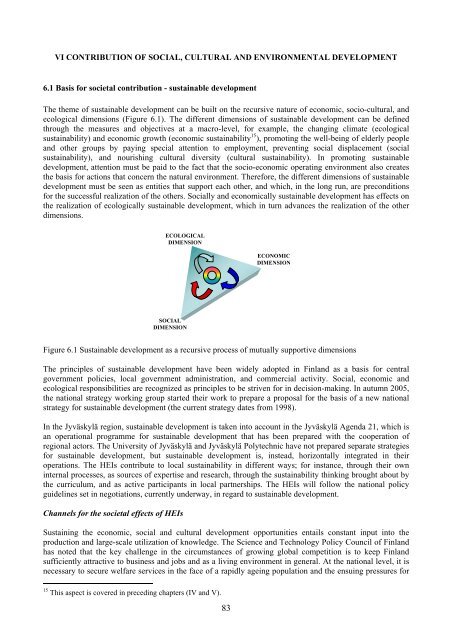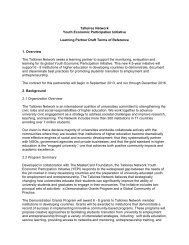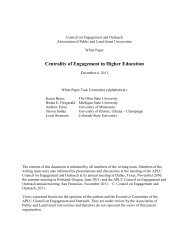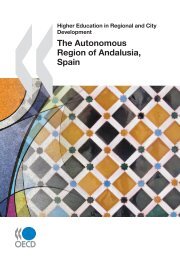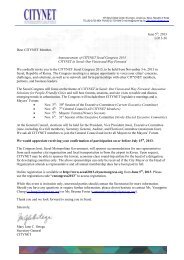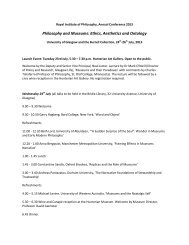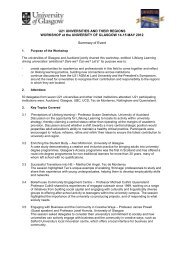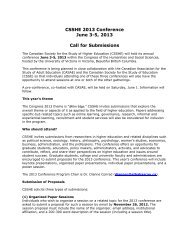VI CONTRIBUTION OF SOCIAL, CULTURAL AND ENVIRONMENTAL DEVELOPMENT6.1 Basis for societal contribution - sustainable developmentThe theme of sustainable development can be built on the recursive nature of economic, socio-cultural, andecological dimensions (Figure 6.1). The different dimensions of sustainable development can be definedthrough the measures and objectives at a macro-level, for example, the changing climate (ecologicalsustainability) and economic growth (economic sustainability 15 ), promoting the well-being of elderly peopleand other groups by paying special attention to employment, preventing social displacement (socialsustainability), and nourishing cultural diversity (cultural sustainability). In promoting sustainabledevelopment, attention must be paid to the fact that the socio-economic operating environment also createsthe basis for actions that concern the natural environment. Therefore, the different dimensions of sustainabledevelopment must be seen as entities that support each other, and which, in the long run, are preconditionsfor the successful realization of the others. Socially and economically sustainable development has effects onthe realization of ecologically sustainable development, which in turn advances the realization of the otherdimensions.ECOLOGICALDIMENSIONECONOMICDIMENSIONSOCIALDIMENSIONFigure 6.1 Sustainable development as a recursive process of mutually supportive dimensionsThe principles of sustainable development have been widely adopted in <strong>Finland</strong> as a basis for centralgovernment policies, local government administration, and commercial activity. Social, economic andecological responsibilities are recognized as principles to be striven for in decision-making. In autumn 2005,the national strategy working group started their work to prepare a proposal for the basis of a new nationalstrategy for sustainable development (the current strategy dates from 1998).In the Jyväskylä region, sustainable development is taken into account in the Jyväskylä Agenda 21, which isan operational programme for sustainable development that has been prepared with the cooperation ofregional actors. The University of Jyväskylä and Jyväskylä Polytechnic have not prepared separate strategiesfor sustainable development, but sustainable development is, instead, horizontally integrated in theiroperations. The HEIs contribute to local sustainability in different ways; for instance, through their owninternal processes, as sources of expertise and research, through the sustainability thinking brought about bythe curriculum, and as active participants in local partnerships. The HEIs will follow the national policyguidelines set in negotiations, currently underway, in regard to sustainable development.Channels for the societal effects of HEIsSustaining the economic, social and cultural development opportunities entails constant input into theproduction and large-scale utilization of knowledge. The Science and Technology Policy Council of <strong>Finland</strong>has noted that the key challenge in the circumstances of growing global competition is to keep <strong>Finland</strong>sufficiently attractive to business and jobs and as a living environment in general. At the national level, it isnecessary to secure welfare services in the face of a rapidly ageing population and the ensuing pressures for15 This aspect is covered in preceding chapters (IV and V).83
taxation, to lower the unemployment rate, which remains high in the aftermath of the early-ninetiesrecession, to improve employment, and to balance regional development.The polytechnics and universities have an important role as the producers of societal effects. However, theiroperation modes and focuses differ. The Finnish polytechnics operate close to the sphere of the working andeveryday life of individuals. Thus, the societal effects of their activities are more direct than those ofuniversities, which are more focused on scientific research and education. One example of this difference canbe found in the production of services or regional project work. Without a strong link to research oreducation, these do not belong to the core operations of universities. To roughly summarize, the polytechnicshave a more direct influence on society whereas the universities have a more indirect effect through theirresearch and education activities.The societal activities of HEIs are strongly integrated to the aims of sustainable development. Firstly, theysupport sustainable economic development; for example, by building networks and providing services tofirms. Secondly, due to the extension of the operation field of HEIs, they also participate in the activitiespromoting social cohesion and preventing social exclusion. The HEIs carry out R&D projects and providedirect services that aim to promote the social inclusion of individuals (e.g., unemployed and elderly people,and other special groups). Thirdly, the HEIs offer cultural and physical exercise services and participate inthe coordination of different events. The fourth element of sustainable development is an ecologic aspect,which is supported by the knowledge based ecological solutions and services produced by HEIs for theprivate and public sector.In the Jyväskylä Polytechnic and University of Jyväskylä, the most promising fields, from the perspective ofsocial effects and the provision of service, can be found in the areas of social and healthcare, environmentaland cultural fields, and their horizontal integration with other fields, such as ICT-adaptations. Themechanisms for the transfer of social and service innovations to general use include diverse project activitiesand larger development programmes.The influence of the HEIs’ project activities is highlighted, in particular, in the areas of social, cultural andenvironmental development. The financial contribution of the European <strong>Region</strong>al Development Fund(ERDF), European Social Fund (ESF), European Agricultural Guidance and Guarantee Fund (EAGGF), issignificant in these projects. In Central <strong>Finland</strong>, during the period 1.1.2000 – 30.6.2005, 20% of all funding(national funding and the contribution of ERDF, ESF and EAGGF) were granted to the projects implementedby the University of Jyväskylä or Jyväskylä Polytechnic. Respectively, 25% of this funding was granted toprojects making direct contributions to the social (14%), cultural (3%) or ecological (8%) dimensions ofsustainable development. These projects are listed in Appendix 15 according to their main focus and amountof funding received. Some of them are research projects and others are direct service projects.6.2 Contribution of HEIs to the social wellbeing of the regionAn ageing population, migration flows from rural municipalities to towns and the subsequently increasingsocial problems form an area where HEIs also have an important role to play. For the HEIs, the innovationsthat support the development of a more effective public sector and the provision of services are some of themain challenges in the near future.Production of public health and wellbeing servicesCentral <strong>Finland</strong>’s Centre of Expertise in Social Field forms a network of actors that aims at developingeffectively organized services and the supporting of the renewal of the service structure. It also contributes tothe applied research in the field of social studies by transferring information about the needs of working lifeto researchers. The University of Jyväskylä and Jyväskylä Polytechnic form an integral part of this network.Both the hospital district of Central <strong>Finland</strong> and the social and health services of the city of Jyväskylä, andother municipalities, are also important partners for the HEIs in the field of social and health care.Jyväskylä Polytechnic responds to public sector needs by providing education and R&D activities in thehealth and social care sector, which uses the applications generated by information and wellness84
- Page 1 and 2:
OECD/IMHE ‐ Supporting thecontrib
- Page 3 and 4:
SUMMARYTogether with 13 other regio
- Page 5 and 6:
8.2 Increasing the regional effecti
- Page 7 and 8:
I INTRODUCTION1.1 Strengthening the
- Page 9 and 10:
development. The aim is that region
- Page 11 and 12:
The self-evaluation considered here
- Page 13 and 14:
densely populated cities in Finland
- Page 15 and 16:
1,9 %1,7 %1,5 %1,3 %Population chan
- Page 17 and 18:
The share of jobs in primary produc
- Page 19 and 20:
New pillars of future’s developme
- Page 21 and 22:
Jyväskylä0,60,91,11,0Central Finl
- Page 23 and 24:
2.4 Governance StructureMunicipalit
- Page 25 and 26:
of its development outside the cent
- Page 27 and 28:
III CHARACTERISTICS OF THE HIGHER E
- Page 29 and 30:
continuing education and open unive
- Page 31 and 32:
The Science and Technology Policy C
- Page 33 and 34: 3.2 Regional dimension within the n
- Page 35 and 36: order to respond to the challenges
- Page 37 and 38: 14001200Master's degreesDoctoratesN
- Page 39 and 40: 900800Youth graduatedAdult graduate
- Page 41 and 42: provide information for the basis o
- Page 43 and 44: CabinetParliamentSTPCSteering (andf
- Page 45 and 46: 5,04,0Billion euros3,02,01,00,083 8
- Page 47 and 48: The number of refereed articles is
- Page 49 and 50: Centre of expertisePaper industryBi
- Page 51 and 52: The Institute for Environmental Res
- Page 53 and 54: and systematic gradually progressin
- Page 55 and 56: are seen to be very important chann
- Page 57 and 58: Internal support units of HEIsThe F
- Page 59 and 60: of interviewed HEI staffs, the coop
- Page 61 and 62: areas of the region’s Centre of E
- Page 63 and 64: system of Jyväskylä and the HEIs
- Page 65 and 66: V CONTRIBUTION OF TEACHING AND LEAR
- Page 67 and 68: esources to establish new activitie
- Page 69 and 70: The main problem for the Finnish la
- Page 71 and 72: longer. 2.5% of the Jyväskylä Pol
- Page 73 and 74: activities. As a part of the new qu
- Page 75 and 76: education programmes consisting of
- Page 77 and 78: the TE-Centre of Central Finland an
- Page 79 and 80: practices in the provision of educa
- Page 81 and 82: Reason forskillupgradingDescription
- Page 83: Strengths+ HEIs are actively confro
- Page 87 and 88: Box 6.2 The WIRE -projects: Support
- Page 89 and 90: indoor ice-skating rink, the Rauhal
- Page 91 and 92: The School of Cultural Studies at t
- Page 93 and 94: the number of registered customers
- Page 95 and 96: Box 6.9 Environmental management in
- Page 97 and 98: Strengths+ The significance of HEIs
- Page 99 and 100: eferring to the regional developmen
- Page 101 and 102: Key topics relating to changes in t
- Page 103 and 104: participation in the decision makin
- Page 105 and 106: in the strategy-making process. The
- Page 107 and 108: 7.5 Critical points in promoting th
- Page 109 and 110: 7.Cooperation in strategies concern
- Page 111 and 112: egion is according to national and
- Page 113 and 114: oundaries for further developmental
- Page 115 and 116: joining resources and operations by
- Page 117 and 118: Discussion proposal 15: To ensure d
- Page 119 and 120: achieved by the horizontal utilizat
- Page 121 and 122: Appendix 2 Information on data used
- Page 123 and 124: and finding synergy between the oth
- Page 125 and 126: School of BusinessRoleThe School of
- Page 127 and 128: The challenge of the school from re
- Page 129 and 130: developing wellness and environment
- Page 131 and 132: Faculty of EducationRoleThe Faculty
- Page 133 and 134: and/or graduation thesis is a signi
- Page 135 and 136:
Areas of strength and prioritising
- Page 137 and 138:
Agora Center’s partners from the
- Page 139 and 140:
Currently the priority of ITRI’s
- Page 141 and 142:
Weak spots and areas to develop in
- Page 143 and 144:
Employment and Economic Development
- Page 145 and 146:
Appendix 3 Analysis of the most sig
- Page 147 and 148:
Appendix 4 Regional effects (input-
- Page 149 and 150:
The overall value of production cre
- Page 151 and 152:
Appendix 5 Reform of regional struc
- Page 153 and 154:
Appendix 7 Provision of education i
- Page 155 and 156:
Appendix 8 Statistical information
- Page 157 and 158:
Appendix 10 Statistics on financing
- Page 159 and 160:
Appendix 12 Labour market activity
- Page 161 and 162:
Appendix 14 Master’s Programmes a
- Page 163 and 164:
Uusiutuvan energian tutkimusohjelma
- Page 165 and 166:
BIBLIOGRAPHYAcademy of Finland (200


